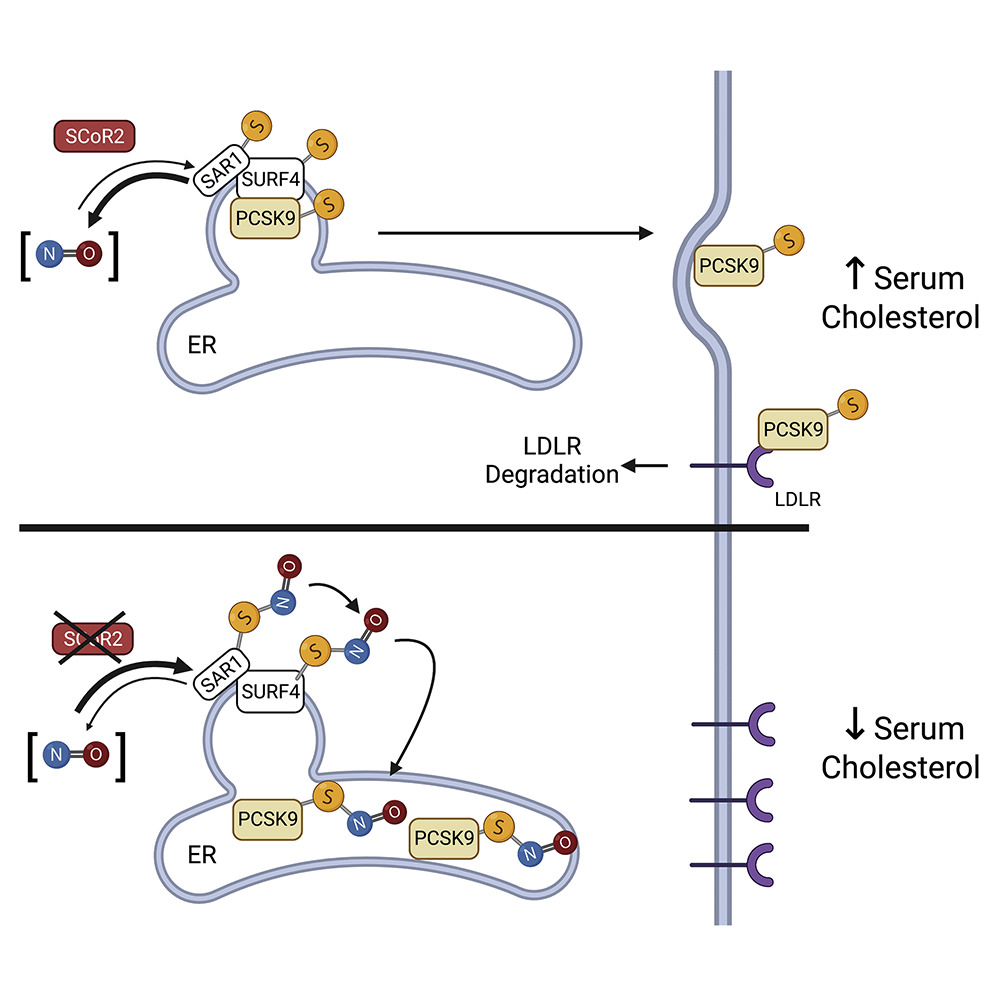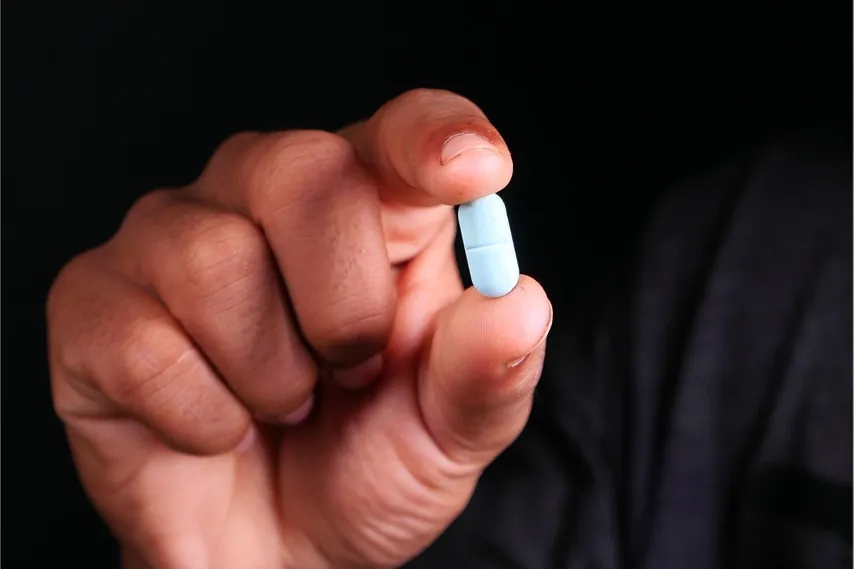博文
新型口服药物可将胆固醇降低70%
||
新型口服药物可将胆固醇降低70%
诸平
据美国克利夫兰的大学医院克利夫兰医学中心(University Hospitals Cleveland Medical Center, Cleveland, OH 44016, USA)2023年1月7日报道,来自该中心和美国凯斯西储大学医学院(Case Western Reserve University School of Medicine, Cleveland, OH 44106, USA)的一个合作团队已确定了一种小分子药物,可以在动物模型中有效降低70%的胆固醇(New Oral Drug Lowers Cholesterol by 70%)。
胆固醇(Cholesterol)是一种蜡状物质,存在于血液中的脂肪/脂质(fats / lipids)中。虽然您的身体需要胆固醇来构建健康的细胞,但过多的胆固醇会导致动脉斑块积聚,增加心脏病发作和中风的风险。
PCSK9抑制剂是仅次于他汀类(statins)药物的第二大最常见的用于控制胆固醇水平的药物。这些药物在降低血液中过量胆固醇方面非常有效,但与可以口服的他汀类药物不同,PCSK9 抑制剂必须注射,这可能是某些人使用它们的障碍。
大学医院克利夫兰医学中心和凯斯西储大学医学院的研究人员合作,开发了一种可以口服的小分子药物。在动物模型中,该药物已被证明可显著降低PCSK9水平并将胆固醇降低70%。相关研究结果于2022年10月25日已经在《细胞报告》(Cell Reports)杂志网站发表——Colin T Stomberski, Nicholas M Venetos, Hua-Lin Zhou, Zhaoxia Qian, Bryce R Collison, Seth J Field, Richard T Premont, Jonathan S Stamler. A multienzyme S-nitrosylation cascade regulates cholesterol homeostasis. Cell Reports, 25 October 2022, 41(4): 111538. DOI: 10.1016/j.celrep.2022.111538. https://doi.org/10.1016/j.celrep.2022.111538
此项研究结果代表了一种控制胆固醇的新方法,也可能对癌症治疗产生影响。
此研究论文的通讯作者、大学医院哈灵顿发现研究所(Harrington Discovery Institute at UH)所长、医学博士乔纳森·斯塔姆勒(Jonathan S. Stamler)说:“降低胆固醇是我们延长寿命和保护人们免受心脏病的最重要疗法之一,心脏病仍然是西方世界发病率和死亡率的头号原因。”乔纳森·斯塔姆勒还是罗伯特·赖特曼和西尔薇娅·赖特曼家族基金会心血管创新特聘教授(Robert S. and Sylvia K. Reitman Family Foundation Distinguished Professor of Cardiovascular Innovation),以及大学医院和凯斯西储大学医学院的医学和生物化学教授(Professor of Medicine and Biochemistry at UH and Case Western Reserve School of Medicine)。他说:“到目前为止,他汀类药物只能降低胆固醇。我们认为我们的研究结果是另一种药物类别,代表了一种降低胆固醇的新方法,也是一种命中PCSK9的新方法。”
研究结果(Study Findings)
胆固醇调节的核心是低密度脂蛋白(Low Density Lipoprotein简称LDL)受体(LDL receptors),它位于肝细胞表面并从血液中清除胆固醇,从而降低血清水平。血流中的 PCSK9 通过标记它们进行降解来控制LDL受体的数量。因此,抑制PCSK9的药物会增加去除胆固醇的LDL受体的数量。
一氧化氮(Nitric oxide)是一种已知可以通过扩张血管来预防心脏病发作的分子。在这项新研究中,乔纳森·斯塔姆勒及其同事表明,一氧化氮还可以靶向并抑制PCSK9,从而降低胆固醇。他们发现了一种小分子药物,可以增加PCSK9的一氧化氮失活。用这种药物治疗的小鼠显示低密度脂蛋白“坏”胆固醇(LDL “bad” cholesterol)减少了70%。
超越胆固醇治癌(Beyond Cholesterol to Cancer)
除了影响胆固醇代谢领域外,这些发现还可能影响癌症患者,因为新出现的证据表明靶向 PCSK9可以提高癌症免疫疗法的疗效。
乔纳森·斯塔姆勒说:“PCSK9不仅针对LDL受体进行降解,而且还介导淋巴细胞(lymphocytes)上MHC 1的降解,淋巴细胞用于识别癌细胞。PCSK9有效地阻止了淋巴细胞识别癌细胞。因此,如果抑制PCSK9,就可以增强机体的癌症监测能力。有朝一日可能会有机会将这些新药应用于这种需要。”
上述介绍,仅供参考。欲了解更多信息,敬请注意浏览原文或者相关报道。
• Genetic or pharmacologic inhibition of the denitrosylase SCoR2 reduces serum cholesterol
• SCoR2 functions as a COPII denitrosylase to facilitate PCSK9 export from the ER
• COPII proteins SAR1B and SURF4 act as nitrosylases to direct S-nitrosylation of PCSK9
• S-nitrosylated PCSK9 is poorly secreted, lowering serum cholesterol
Accumulating evidence suggests that protein S-nitrosylation is enzymatically regulated and that specificity in S-nitrosylation derives from dedicated S-nitrosylases and denitrosylases that conjugate and remove S-nitrosothiols, respectively. Here, we report that mice deficient in the protein denitrosylase SCoR2 (S-nitroso-Coenzyme A Reductase 2; AKR1A1) exhibit marked reductions in serum cholesterol due to reduced secretion of the cholesterol-regulating protein PCSK9. SCoR2 associates with endoplasmic reticulum (ER) secretory machinery to control an S-nitrosylation cascade involving ER cargo-selection proteins SAR1 and SURF4, which moonlight as S-nitrosylases. SAR1 acts as a SURF4 nitrosylase and SURF4 as a PCSK9 nitrosylase to inhibit PCSK9 secretion, while SCoR2 counteracts nitrosylase activity by promoting PCSK9 denitrosylation. Inhibition of PCSK9 by an NO-based drug requires nitrosylase activity, and small-molecule inhibition of SCoR2 phenocopies the PCSK9-mediated reductions in cholesterol observed in SCoR2-deficient mice. Our results reveal enzymatic machinery controlling cholesterol levels through S-nitrosylation and suggest a distinct treatment paradigm for cardiovascular disease.

https://blog.sciencenet.cn/blog-212210-1371278.html
上一篇:基于新陈代谢的个性化饮食更有利于健康
下一篇:新研究将更强的使命感与更低的死亡风险联系起来
